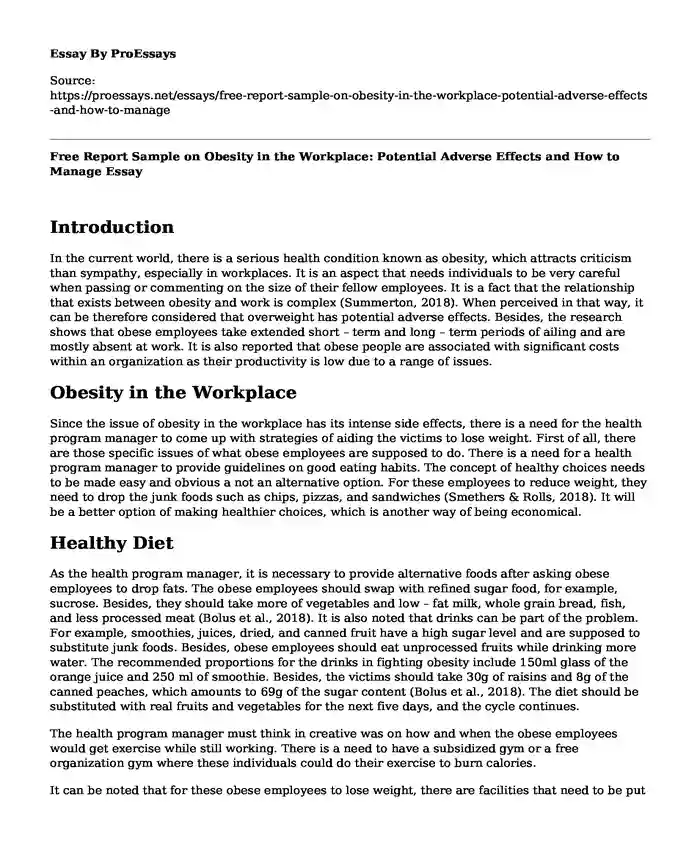Introduction
In the current world, there is a serious health condition known as obesity, which attracts criticism than sympathy, especially in workplaces. It is an aspect that needs individuals to be very careful when passing or commenting on the size of their fellow employees. It is a fact that the relationship that exists between obesity and work is complex (Summerton, 2018). When perceived in that way, it can be therefore considered that overweight has potential adverse effects. Besides, the research shows that obese employees take extended short – term and long – term periods of ailing and are mostly absent at work. It is also reported that obese people are associated with significant costs within an organization as their productivity is low due to a range of issues.
Obesity in the Workplace
Since the issue of obesity in the workplace has its intense side effects, there is a need for the health program manager to come up with strategies of aiding the victims to lose weight. First of all, there are those specific issues of what obese employees are supposed to do. There is a need for a health program manager to provide guidelines on good eating habits. The concept of healthy choices needs to be made easy and obvious a not an alternative option. For these employees to reduce weight, they need to drop the junk foods such as chips, pizzas, and sandwiches (Smethers & Rolls, 2018). It will be a better option of making healthier choices, which is another way of being economical.
Healthy Diet
As the health program manager, it is necessary to provide alternative foods after asking obese employees to drop fats. The obese employees should swap with refined sugar food, for example, sucrose. Besides, they should take more of vegetables and low – fat milk, whole grain bread, fish, and less processed meat (Bolus et al., 2018). It is also noted that drinks can be part of the problem. For example, smoothies, juices, dried, and canned fruit have a high sugar level and are supposed to substitute junk foods. Besides, obese employees should eat unprocessed fruits while drinking more water. The recommended proportions for the drinks in fighting obesity include 150ml glass of the orange juice and 250 ml of smoothie. Besides, the victims should take 30g of raisins and 8g of the canned peaches, which amounts to 69g of the sugar content (Bolus et al., 2018). The diet should be substituted with real fruits and vegetables for the next five days, and the cycle continues.
The health program manager must think in creative was on how and when the obese employees would get exercise while still working. There is a need to have a subsidized gym or a free organization gym where these individuals could do their exercise to burn calories.
It can be noted that for these obese employees to lose weight, there are facilities that need to be put in place. For example, the gym facilities and sports facilities need to be paid for. For the gym services, the employees can attend the gym for free, but if they need a trainer, they will take up the cost of paying them. However, to encourage more obese employees to attend the gym, it is necessary to subsidize the associated costs. On the issue of changing the eating habits, these employees should own up the cost and ensure they are taking diet as recommended. In the program of feeding, there is no subsidizing of the diet. On the issue involving active travel policy, an organization has to cover the full costs as it is the responsibility to ensure employees well–being is catered for. It is noted that the healthier employees are, the more productive they are, and even the more flexible they are. Therefore, all the costs of providing leisure for employees should be covered by an organization as it benefits a lot when they are at their peak.
Conclusion
The evaluation of the results will be done through physical observations. It is noted that after obese people are subjected to various active activities and change diet, they tend to lose weight. Besides, assessing the breathing rate after a certain period will help determine whether individuals have lost weight. It is discovered that the breathing rate of obese people is higher, and if there is notable weight loss, then it could be detected through the reduction of breathing rate.
References
Bolus, W. R., Kennedy, A. J., & Hasty, A. H. (2018). Obesityinduced reduction of adipose eosinophils is reversed with lowcalorie dietary intervention. Physiological reports, 6(22).
Smethers, A. D., & Rolls, B. J. (2018). Dietary management of obesity: cornerstones of healthy eating patterns. Medical Clinics, 102(1), 107-124.
Summerton, N. (2018). Better value health checks: a practical guide. CRC Press.
Swift, D. L., McGee, J. E., Earnest, C. P., Carlisle, E., Nygard, M., & Johannsen, N. M. (2018). The effects of exercise and physical activity on weight loss and maintenance. Progress in cardiovascular diseases, 61(2), 206-213.
Cite this page
Free Report Sample on Obesity in the Workplace: Potential Adverse Effects and How to Manage. (2023, Oct 12). Retrieved from https://proessays.net/essays/free-report-sample-on-obesity-in-the-workplace-potential-adverse-effects-and-how-to-manage
If you are the original author of this essay and no longer wish to have it published on the ProEssays website, please click below to request its removal:
- Ferguson Missouri Events in August 2015
- Importance of Accountability Essay
- Essay Sample on Occupational Exposure Limits
- Essay Example on Tangible and Intangible Rewards: The Keys to Employee Retention and Motivation
- Paper Example on Workplace Bullying: Impact on Temporary Employees
- Paper Example on Adjusting to School-Shooting Trauma: Role of Attachment
- Sexual Health - Report Example







